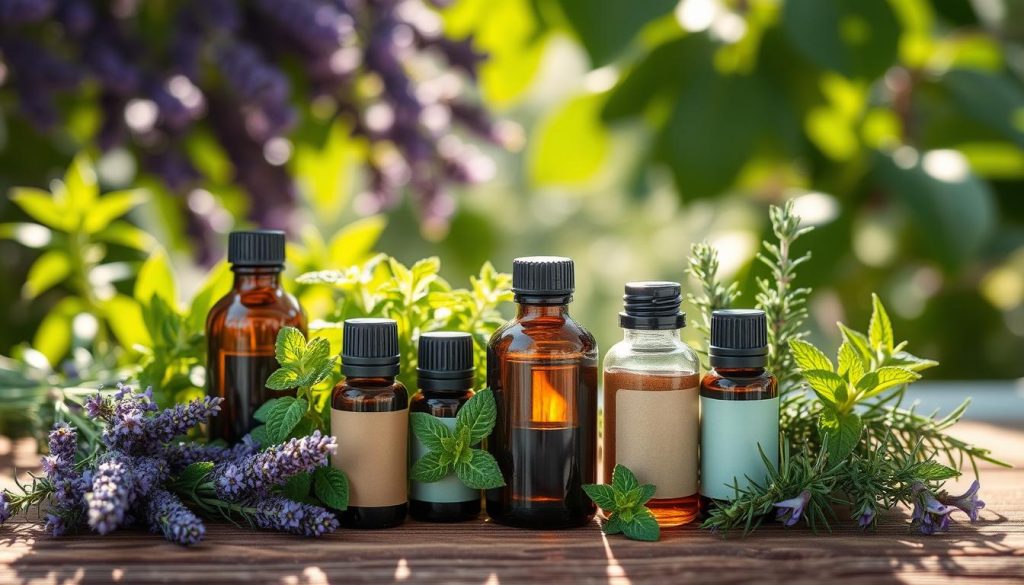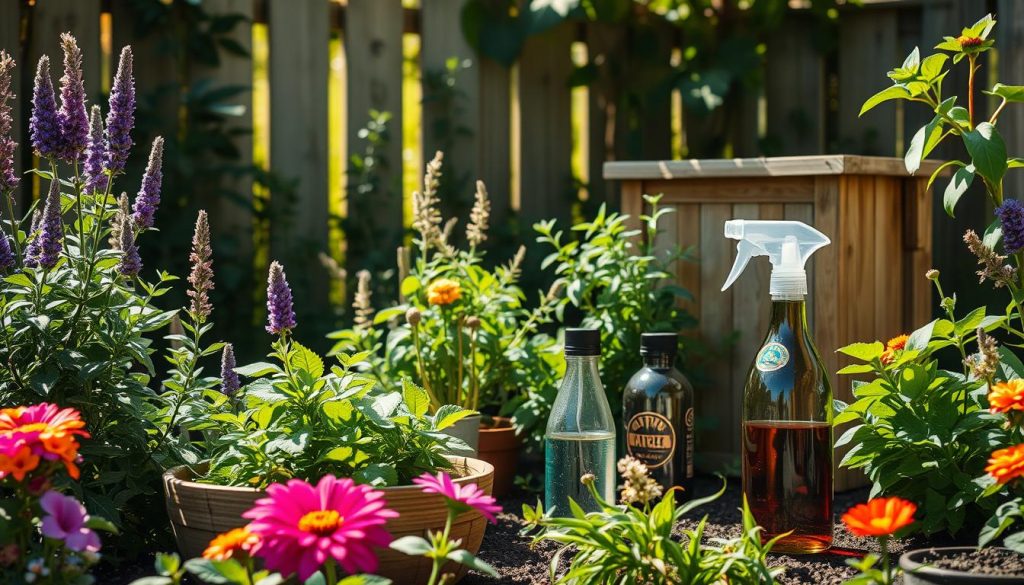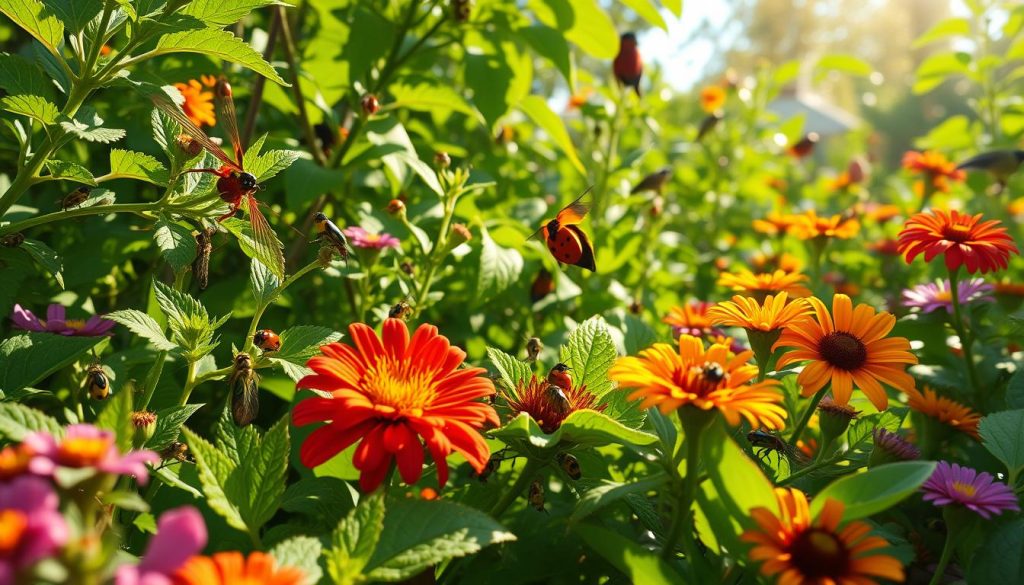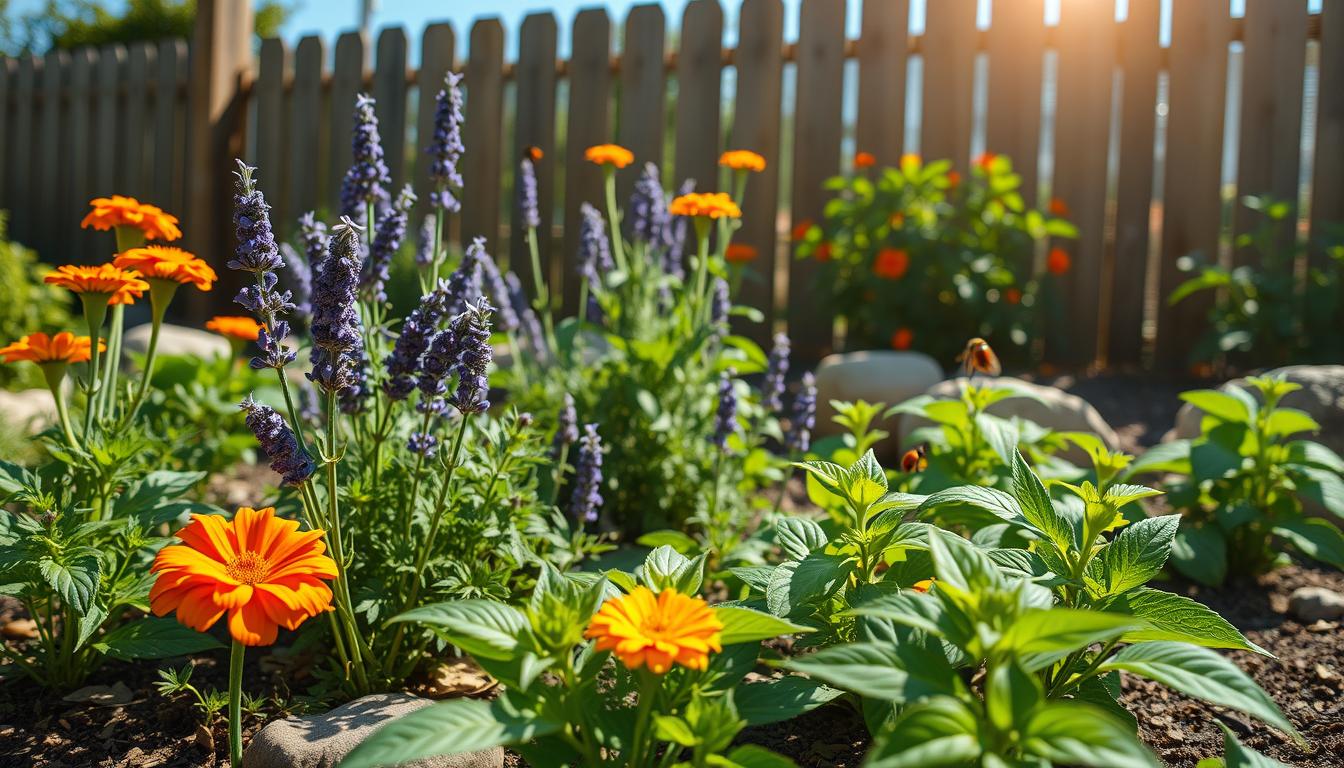I’ve always been passionate about finding natural ways to keep pests away. Over the years, I’ve discovered some effective pest control methods. I’d like to share them with you.
My journey towards natural pest control started when I realized the importance of a healthy environment. I began researching and experimenting with different natural ways to keep pests away. I was amazed at how simple and effective these methods can be.
Through my experiences, I’ve learned that natural pest control methods are better for the environment. They’re also safer for my family and pets. I’m excited to share my favorite methods with you. From using essential oils to creating a pest-resistant garden, I hope you’ll join me on this journey.
Understanding Common Household Pests
Exploring pest control, I see how key it is to know the pests. Pests like ants, mosquitoes, and rodents can be annoying and harmful. Eco-friendly pest repellents offer a safer choice than chemical pesticides.
It’s vital to know which pest you’re dealing with to use the right non-toxic bug deterrents. For example, ants love sweet or sticky things, and mosquitoes prefer standing water. Knowing this, I can use natural items like essential oils or herbs to keep them away.
Identifying Everyday Invaders
- Ants: attracted to sweet or sticky substances
- Mosquitoes: drawn to standing water
- Rodents: attracted to food and shelter
Using eco-friendly pest repellents keeps my family and the planet safe. Non-toxic bug deterrents are better for the environment because they don’t pollute the air or water. Switching to these options helps me live more sustainably.
Why Natural Solutions Are Best
Natural solutions are not only effective but also safer for my home. Choosing eco-friendly pest repellents means less risk of toxic chemical exposure. This is crucial for families with pets or young kids, as they’re more sensitive to pesticides.
Essential Oils That Deter Pests
I’ve found that essential oils are a great way to practice organic pest management in my home. They help keep pests away without harming the environment. I love making a pest-deterrent spray with a mix of essential oils.
Research shows that some essential oils work better than others at keeping pests away. Peppermint, lemongrass, and lavender are among the best. You can use them alone or together for a strong spray.
Top Essential Oils to Use
- Peppermint oil: known for its strong scent that repels ants and spiders
- Lemongrass oil: effective at repelling mosquitoes and flies
- Lavender oil: helps to calm and repel moths and other pests
How to Create an Effective Spray
To make a spray, mix a few drops of your chosen essential oil with water in a spray bottle. Add a bit of dish soap to help the oil mix. This spray can repel pests from surfaces, plants, and even skin.

Using essential oils in my pest management routine has kept my home pest-free. Natural insect repellents are safe and effective. I highly recommend trying them.
Creating a Pest-Resistant Garden
To make a garden that fights off pests, I use homemade pest control and safe methods. This keeps pests away and keeps my garden healthy. Natural and organic ways help keep the garden balanced and good for plants and the environment.
Companion planting is a key way to fight pests. It means planting some plants with others to keep pests away and help them grow. For instance, marigolds with tomatoes fight nematodes, and basil keeps pests from peppers. This way, I use less pesticides and make my garden more eco-friendly.
Companion Planting for Pest Control
- Planting marigolds with tomatoes to repel nematodes
- Planting basil with peppers to keep pests away
- Planting nasturtiums with cabbage to repel aphids and whiteflies
Natural Barriers to Keep Pests Away
I also use natural barriers to keep pests out. This includes using mesh or netting to block insects. I also spray garlic and hot pepper to keep pests away. These methods help my garden fight pests with little effort.
The Power of Cleanliness
Cleanliness is key in stopping pests from taking over. Keeping my home clean makes it less appealing to pests. Simple steps like vacuuming, dusting, and wiping surfaces down help a lot. I also make sure to throw out trash often and keep kitchen counters clean and dry.
Storing food in sealed containers and organizing my pantry are natural ways to keep pests away. These steps help remove food sources that pests might find attractive. By doing these simple things, I make my home less welcoming to pests. Here are some more tips:
- Regularly cleaning and inspecting my home for any signs of pest activity
- Sealing any cracks or crevices that may provide entry points for pests
- Keeping my yard clean and free of debris

By using these DIY pest prevention techniques and natural methods, I can keep pests out. Regular cleaning and proper food storage are crucial. I make sure to follow these practices every day to keep my home pest-free.
Homemade Repellents: Quick Recipes
I’ve found joy in making my own eco-friendly pest repellents. These quick recipes are not only effective but also safe for the environment. I’ll share two of my favorites that use common household items.
These recipes are perfect for those who want to control pests naturally. By using these homemade repellents, we can avoid harmful chemicals. This makes our homes safer for our families and pets.
Vinegar-Based Solutions
Vinegar is great for keeping ants and spiders away. Mix equal parts water and white vinegar in a spray bottle. Add a few drops of lemon essential oil for a nice smell. Spray it on surfaces or use it to clean countertops and sinks.
Garlic and Pepper Mixtures
Garlic and pepper can keep mosquitoes and flies away. Blend 3-4 cloves of garlic, 1 teaspoon of black pepper, and 1 cup of water. Strain it and put it in a spray bottle. Spray it around windows and doors to keep pests out.
These homemade repellents are easy to make and use. By choosing eco-friendly options, we can make our homes healthier and more sustainable. This benefits us and our loved ones.
Natural Predators: Friends in the Garden
Exploring organic pest management, I’ve learned the value of natural predators in my garden. These beneficial insects help control pests without harsh chemicals. By using natural repellents and creating a welcoming space, I attract these helpful creatures.
Understanding which beneficial insects to attract is key. Ladybugs, lacewings, and parasitic wasps are great for controlling pests. They eat aphids, whiteflies, and caterpillars, reducing the need for pesticides.
Beneficial Insects to Attract
- Ladybugs: Known for their appetite for aphids and other soft-bodied insects
- Lacewings: Effective predators of whiteflies, aphids, and other small insects
- Parasitic wasps: Targeted predators of caterpillars and other pest insects
How to Create a Welcoming Environment
To welcome beneficial insects, I plant a variety of nectar-rich flowers, herbs, and shrubs. I also avoid broad-spectrum pesticides to protect these insects. This holistic approach helps my garden thrive and benefits the environment.

The Role of Herbs in Pest Control
Exploring natural pest control, I found herbs play a big role. Many herbs can keep pests away, making them perfect for safe pest control. Using these herbs daily helps me keep my space pest-free without harsh chemicals.
Basil, mint, and lemongrass are top herbs for repelling pests. I can grow them in my garden or in pots. They also add flavor to my cooking and help with health issues.
Growing Pest-Repellent Herbs
It’s easy to grow pest-repellent herbs. Start by planting them in good soil and lots of sunlight. Water and prune them regularly. Natural fertilizers like compost help them grow strong and pest-free.
Using Herbs in Everyday Life
I also use herbs in different ways to keep pests away. Adding fresh herbs to food containers keeps pests out of my pantry. Herbal sprays or infusions can also repel pests from my garden and home. This way, I have a safe and sustainable pest control plan.
Using herbs for pest control makes my home and garden safe for my family and the environment. With a bit of creativity, I find new ways to use herbs to keep pests away and maintain a healthy space.
Long-Term Strategies for Pest Management
Keeping pests out of my home is a constant task. I must always be on the lookout for any signs of pests. This way, I can catch problems early and solve them before they get worse.
Being alert and ready to act is key. This lets me effectively manage pests using natural ways to keep them away.
Regular Monitoring and Maintenance
Regular checks and a tidy home are essential for pest control methods. I always look for signs of pests and fix any entry points right away. Keeping my home clean and organized helps keep pests out.
Sealing up cracks and crevices is also important. It stops pests from getting into my home.
Adapting My Approach Based on Season
My pest control plans change with the seasons. In warmer months, I focus more on keeping insects away. In cooler months, I work to prevent pests from staying over winter.
Being flexible and adjusting my methods keeps my home pest-free all year.

